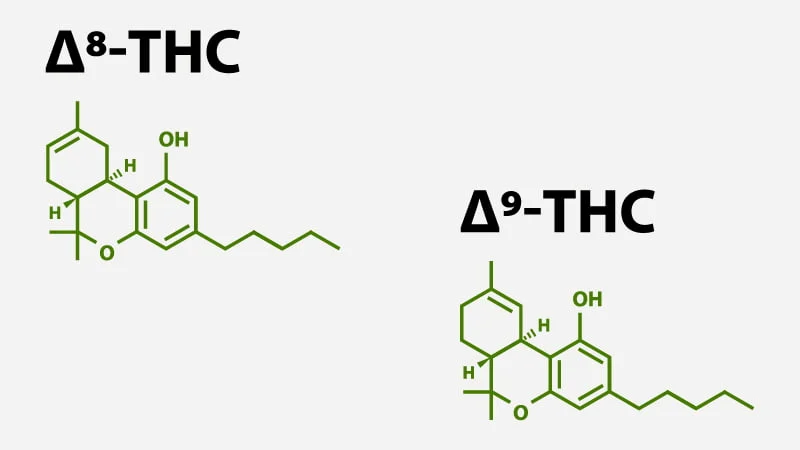
Delta 9 tetrahydrocannabinol (THC) is the most well-known and widely studied cannabinoid in cannabis. It’s responsible for the psychoactive effects commonly associated with marijuana use. Recent research, such as a study published in the Journal of Experimental Botany, indicates that Delta 9 THC interacts with the endocannabinoid system, influencing mood, memory, and appetite.

The psychoactive nature of Delta 9 THC has led to its classification as a Schedule I controlled substance in many countries, including the United States. However, its medicinal properties, such as pain relief and antiemetic effects, have prompted the development of pharmaceuticals like Marinol.
Delta 8 THC: A Lesser-Known Cousin:
Delta 8 THC, on the other hand, is a less talked-about cannabinoid but is gaining popularity for its unique properties. It is an analog of Delta 9, sharing a similar molecular structure with a slight variation in the double bond placement. Research, like a 2020 study published in the journal Cannabis and Cannabinoid Research, suggests that Delta 8 THC exhibits antiemetic, anxiolytic, and analgesic properties without the intense psychotropic effects associated with Delta 9 THC.
Delta 8 vs Delta 9 chemical structure
The chemical structures of Delta-8 THC (tetrahydrocannabinol) and Delta-9 THC are similar, with a few key differences. Both compounds belong to the family of cannabinoids found in cannabis plants. Here’s a brief overview of their chemical structures:
Delta-8 THC:
Delta-8 THC has a molecular structure closely related to Delta-9 THC, with the main distinction being the placement of a double bond in the chain. In Delta-8 THC, this double bond is located on the 8th carbon atom in the chain, hence the name. The full title is Delta-8-tetrahydrocannabinol.
Delta-9 THC:
Delta-9 THC is the more well-known and prevalent form of THC in cannabis. The double bond in Delta-9 THC is located on the 9th carbon atom in the chain, giving it its name. The full title is Delta-9-tetrahydrocannabinol.
The slight difference in the placement of the double bond affects the three-dimensional shape of the molecules and, consequently, their interaction with the body’s endocannabinoid system. Despite the structural similarity, this slight variance is believed to contribute to the differing psychoactive effects reported by users of Delta-8 and Delta-9 THC. Delta-8 THC is often described as producing a milder high compared to the more intense effects associated with Delta-9 THC.
Delta 8 vs Delta 9 Gummies:
As the world of cannabis continues to evolve, consumers are faced with an array of choices when it comes to products containing cannabinoids. Delta 8 THC and Delta 9 THC, two compounds found in cannabis plants, have become popular choices, especially in the form of gummies. Let’s explore the differences between Delta 8 vs Delta 9 gummies to help you make an informed decision.

1. Psychoactive Effects:
Delta 9 THC Gummies:
Delta 9 THC is renowned for its psychoactive effects, often associated with the classic “high” experienced by marijuana users. Gummies infused with Delta 9 THC can deliver potent euphoria and relaxation. However, this may come with side effects such as anxiety or paranoia, particularly in individuals sensitive to THC.
Delta 8 THC Gummies:
Delta 8 THC, while still psychoactive, is reported to produce a milder and more manageable high compared to Delta 9 THC. Gummies infused with Delta 8 are becoming increasingly popular for those seeking a more subtle experience without the intensity commonly associated with traditional Delta 9 THC products.
2. Legality:
Delta 9 THC Gummies:
The legality of Delta 9 THC gummies largely depends on the jurisdiction. In many places, products with high levels of Delta 9 THC remain subject to strict regulations due to their psychoactive nature, making them illegal or available only through medical dispensaries.
Delta 8 THC Gummies:
Delta 8 THC, derived from hemp, exists in a legal gray area in several regions. In the United States, for example, the 2018 Farm Bill legalized hemp-derived Delta 8 THC with restrictions on Delta 9 THC content. This legal distinction has led to an influx of Delta 8 THC gummies in the market.
3. Potency:
Delta 9 THC Gummies:
Delta 9 THC gummies are known for their potency, offering a robust and immediate effect. This potency, however, may be overwhelming for some users, especially those new to cannabis or those looking for a more subtle experience.
Delta 8 THC Gummies:
Delta 8 THC gummies are often praised for their balanced potency. Users report a less intense high, making them suitable for individuals who want to experience the therapeutic benefits of THC without the overpowering effects.
4. Therapeutic Potential:
Delta 9 THC Gummies:
Delta 9 THC has well-established therapeutic properties, including pain relief, nausea reduction, and appetite stimulation. Pharmaceutical products like Marinol, containing synthetic Delta 9 THC, have been developed to harness these benefits.
Delta 8 THC Gummies:
Research on Delta 8 THC’s therapeutic potential is still in its early stages. Preliminary studies, such as those published in the journal Cannabis and Cannabinoid Research, suggest potential benefits for anxiety, pain, and inflammation, making Delta 8 THC gummies an intriguing option for those seeking therapeutic effects without the intensity of Delta 9 THC.
Delta-10 vs Delta-8 vs Delta-9
The cannabis landscape continues to expand, introducing consumers to an array of cannabinoids with distinct properties. Delta-9, Delta-8, and the relatively newer arrival, Delta-10 THC, have become prominent players in this evolving arena. Delta-9 THC, the well-known psychoactive compound in cannabis, has been a focal point for its potent effects. Delta-8 THC, a milder analogue of Delta-9, has gained popularity for its balanced psychoactivity and legal accessibility in certain regions. 
On the horizon is Delta-10 THC, a compound with a unique molecular structure that sets it apart from its counterparts. Delta-10 is still undergoing exploration in terms of its effects and potential therapeutic benefits. Early anecdotal reports suggest a distinctive, uplifting experience. As the scientific community delves deeper into the nuances of these cannabinoids, consumers are faced with a fascinating array of choices. Each offers a unique take on the therapeutic and recreational potential of cannabis-derived compounds.
Delta-8 vs Delta-9 legality
One of the significant differences between Delta 9 and Delta 8 is their legal status. Delta 9 THC is often subject to strict regulations due to its psychoactive effects, making it illegal in many places. In contrast, Delta 8 THC exists in a legal grey area. Some countries and U.S. states allow its production and sale, provided it is derived from hemp.
Consumers seeking an alternative to Delta 9 THC may turn to Delta 8 as a legal option, especially in regions where marijuana remains prohibited.
Effects on Anxiety and Psychoactivity:
The psychoactive effects of Delta 9 THC can sometimes lead to heightened anxiety or paranoia, particularly in individuals predisposed to such reactions. Delta 8 THC, however, may offer a milder experience, with users reporting a more clear-headed high and reduced anxiety.
Research, such as a 2021 study in the journal Pharmaceuticals, suggests that Delta 8 THC may have potential therapeutic applications for anxiety and mood disorders, offering a promising alternative for those seeking the benefits of THC without the intensity associated with Delta 9.
Conclusion:
In the ongoing exploration of cannabinoids, Delta 9 vs Delta 8 has emerged as a topic of interest for researchers, consumers, and the cannabis industry as a whole. While Delta 9 THC remains the more well-known and regulated compound. Delta 8 THC is carving out a niche for itself with its distinct properties and potential therapeutic benefits. As research continues, a deeper understanding of these cannabinoids will likely shape the future of medical and recreational cannabis use.
FAQs
Yes, Delta-8 THC may induce relaxation and aid in sleep without the intense psychoactive effects of Delta-9 THC.
Both Delta-8 and Delta-9 THC offer pain relief, but Delta-8 is favoured for its analgesic effects with a milder high.
Delta-8 flowers provide a milder psychoactive experience, while Delta-9 flowers are associated with a more potent high.
Possible side effects include dry mouth, red eyes, or changes in appetite; start with a low dose.
Delta-9 THC is potent for pain, while Delta-8 offers therapeutic benefits with a milder high.
Legal status varies; check local regulations, as Delta-8 THC flowers might be subject to restrictions.







